Closing creditspublished at 14:42 GMT 7 December 2023
That's it from this page - which was brought to you by Adam Durbin, Thomas Mackintosh, Chas Geiger, Emily Atkinson and Heather Sharp. The editor was Rob Corp.
Rishi Sunak defends his Rwanda bill as "the right approach" as pressure mounts within the Tory party and a minister quits
The PM says the bill is the "toughest immigration law ever" and insists it will successfully prevent further legal challenges stopping flights taking off to the East African country
But he admits that the European Court of Human Rights will still be able to challenge asylum seeker deportations
Robert Jenrick earlier quit as immigration minister over the new law, saying it wasn't tough enough
Ex-Home Secretary Suella Braverman echoed his criticism and said it would not effectively stop Channel crossings
But Sunak says going any further will risk sinking the policy altogether
The PM also confirmed that the Commons vote on the Rwanda bill next week will not be treated as a confidence vote in his government
Aside from the draft law, the government has also signed a new treaty with Rwanda to try to get the policy implemented
The Supreme Court blocked the plan last month, saying Rwanda was not safe and could return refugees to the countries they fled
Edited by Rob Corp
That's it from this page - which was brought to you by Adam Durbin, Thomas Mackintosh, Chas Geiger, Emily Atkinson and Heather Sharp. The editor was Rob Corp.
 Thomas Mackintosh
Thomas Mackintosh
Live reporter
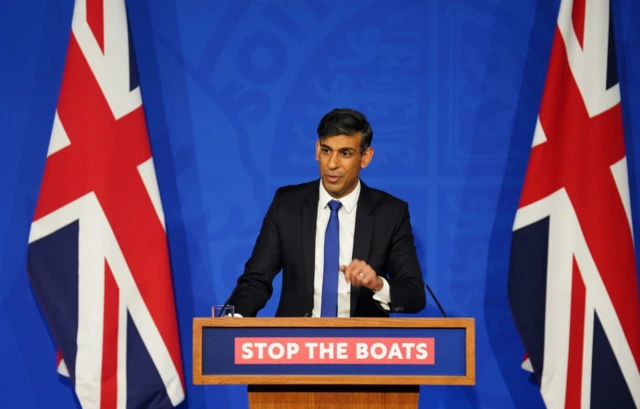 Image source, PA Media
Image source, PA MediaWe are shortly going to be bringing to a close our coverage of what's been an eventful few hours in Westminster and Whitehall.
It actually all started last night when Immigration Minister Robert Jenrick quit the government over new Rwanda asylum legislation which he said wouldn't go far enough.
Then came along the former home secretary who turned up the pressure on Rishi Sunak's plans.
Suella Braverman - who was only sacked by Sunak three weeks ago - didn't mince her words when she appeared on Radio 4's Today programme, saying his policy "won't work" and "won't stop the boats".
She urged the PM to change course, but it appears Sunak is sticking to his present heading.
At 11:00 on the dot Sunak was in the Downing Street news conference suite to deliver a defiant and strong defence of his government's new legislation. He urged everyone to get onboard and back his plan.
With the Commons due to vote on the next Parliamentary stage of the Rwanda Bill's progress this coming Tuesday, there's plenty more to come with this particular political story.
Until then, here is some further reading from my colleagues for you to enjoy:

 Mark Easton
Mark Easton
Home editor
At his press conference, the prime minister was obviously speaking very much to his own back benchers and addressing the divisions in his party.
But there will be people on the other side of the argument who will be looking at this with some horror.
They will point out that there will be some victims of modern slavery and genuine asylum seekers arriving by what the government calls illegal routes, who would in normal circumstances be granted refugee status in the UK.
It’s worth noting that many people who come in small boats are from countries that have very high levels of acceptance under the asylum system - a Refugee Council analysis of recent small boat arrivals suggests around 75% would be granted refugee status because of where they have come from.
But Rishi Sunak says nevertheless they will be treated as illegal migrants and nearly all the avenues for them to make legal challenges will be blocked.
I think we will see test cases in the courts to see if the legislation is as impermeable as the PM and government lawyers who helped put it together believe it is.
It will also be interesting to see what the Rwandan government thinks about those kinds of cases, because part of what Rwanda wants to do is to demonstrate it is a progressive, modern country with a belief in the rule of law.
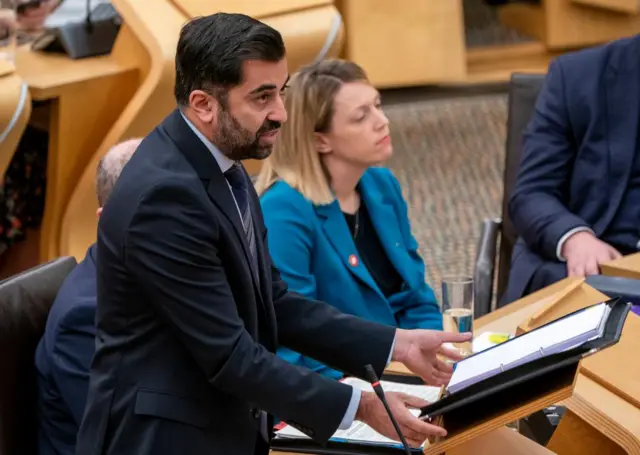 Image source, PA Media
Image source, PA MediaScotland's first minister Humza Yousaf has described the UK government's plan to pass a new law so as to close of legal challenges to its Rwanda asylum-seeker processing plan as a "dark day" for the country.
The leader of the SNP accused successive Labour and Tory governments of dismantling the UK's immigration and asylum processes "bit-by-bit".
Speaking at First Minister's Questions at Holyrood in Edinburgh earlier, Yousaf said the government's immigration plan means asking migrants to "look after our own family members" while "abandoning their own back home".
He added the asylum plans mean the government has "virtually eliminated any practical legal route for those that are fleeing war or persecution".
Quote MessageThe policies of the UK government in this respect are not only morally repugnant, but they are economically illiterate."
Yousaf, whose father came to Scotland from Pakistan in the 1960s to work in a sewing machine factory, told MSPs in Holyrood that his party and the Scottish government "values migration".
He added this is due to the "importance of it to our social fabric but also to our economy".
The legal case against the government's Rwanda policy was brought by the charity Asylum Aid, as well as 10 people from countries including Syria, Iraq and Albania, who arrived in the UK in small boats.
Asylum Aid has shared its response, external to the Home Office's Rwanda Bill:
"It is shocking that just three weeks after the Supreme Court decided that Rwanda was unsafe for refugees, the government is asking Parliament to reach a different judgment and simply conclude that Rwanda is safe.
"It is an affront to the rule of law, basic standards of fairness and the protection of individual rights, which are the cornerstones of our democracy.
"It shows a complete lack of respect for the constitutional role of the Courts in ensuring that the government is not above the law."
Here's a quick summary of what has happened this morning - as we've been reporting on Robert Jenrick's resignation as immigration minister, former Home Secretary Suella Braverman on the Today programme, and Rishi Sunak's news conference about the Rwanda asylum plan:
 Ione Wells
Ione Wells
Political correspondent
The warring Tory factions may sound familiar if you remember the Brexit days and Theresa May's headache trying, and ultimately failing, to appease them both.
This all has quite an air of 2018 about it, when the former PM found herself at the centre of rebellions from different sides over her Brexit legislation.
Some MPs fear Rishi Sunak is repeating what they see as mistakes of the past.
As one put it to me, his press conference earlier seemed to be "channelling Theresa May" to talk to MPs via the television - rather than more effectively in person.
They argue this approach didn't seem to help at all.
 Ione Wells
Ione Wells
Political correspondent
The prime minister's press conference doesn't seem to have done much to calm tensions on either wing of the Conservative Party.
The European Research Group (ERG) - made up of Brexiteer MPs on the right - has several lawyers in its ranks studying the new bill “forensically” to figure out if they are happy with it, we’re told.
They feel Robert Jenrick's resignation was significant - and are not expected to give a judgement on whether they'll vote for, against, or try change the bill for a few days.
Many ERG MPs worry it leaves the system too open for appeals, with the European Court of Human Rights still able to challenge removals.
On the other flank is the "One Nation" grouping, perceived as the more centrist wing, who are particularly worried about the bill "declaring" Rwanda a safe country.
With no court able to say otherwise, they are concerned it could set up a potential conflict between government and judiciary.
They are being advised by a former Tory solicitor general, and are also not expected to reveal their plans yet.
The bill is set to get its second reading on Tuesday, but some may wait until its later stages to rebel or attempt amendments.
Former Conservative leader Lord Howard has just been on BBC Radio 4's The World at One programme.
He says he believes the Rwanda Bill is a "measured response to a challenge we all face as a country".
"I think it could work and I hope it can command the support of Conservative members of Parliament," he tells the programme.
"These are difficult issues and the prime minister has been brave enough and bold enough to face up to these issues rather than to let them fester and he's put forward a plan... which I think can work."
He says he believes Rishi Sunak can win the next general election, claiming he looks strong because he's "been prepared to take the difficult decisions and deal with this issue and bring forward a plan which those with legal experience of the highest order think can work".
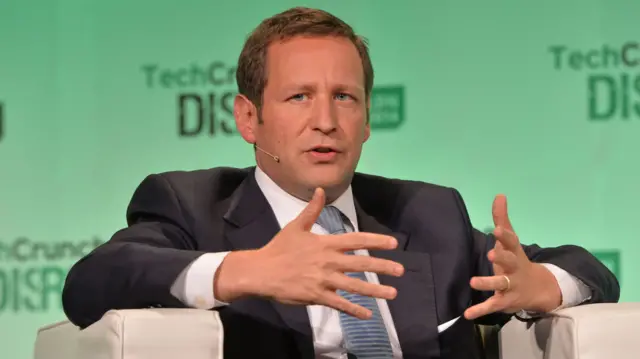 Image source, Getty Images
Image source, Getty ImagesThe sacking of Suella Braverman and Robert Jenrick's resignation have "morphed into a shadow leadership contest", a former Conservative minister has told the BBC.
Ed Vaizey, who is now a member of the House of Lords, says both of their statements after leaving are odd because they highlight government successes - like reducing the number of Albanians on small boats by signing a deal.
But these do not seem to have been enough, he says, because ministers have "made Rwanda and getting flights to Rwanda the absolute one test of success".
Vaizey told the BBC he did not think Sunak was "wise to make stopping the boats one of his five tests".
"It's now become a test from the right of the Conservative Party about the success of the prime minister," he added.
Vaizey, who is from the left of the party, says it will be harder for Sunak to blame judges or "the establishment" for a possible failure of the Rwanda policy because "he's now got a significant wing of his own party saying it's his fault".
"It's a very unfortunate position to be in," he adds.
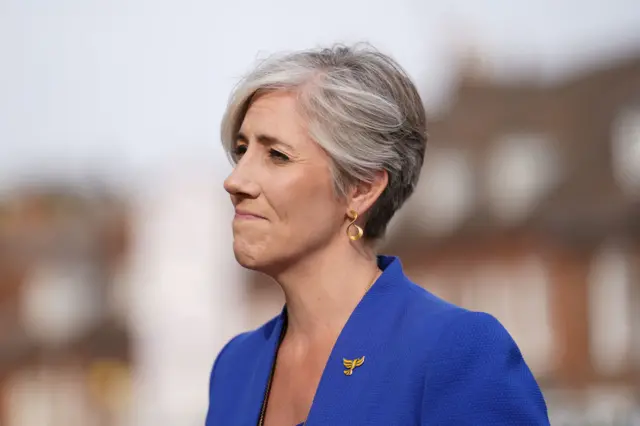 Image source, PA Media
Image source, PA MediaThe Liberal Democrats have described Sunak's news conference as "desperate stuff from a lame-duck prime minister who has lost control of his party".
Lib Dem deputy leader Daisy Cooper says using a Downing Street press conference to try to persuade Conservative MPs to back the "failed Rwanda plan" is a "new low".
Sunak needs to call an election now, she adds, "so we can end this Conservative chaos and put this government out of its misery".
Joshua Nevett
Political reporter, BBC News
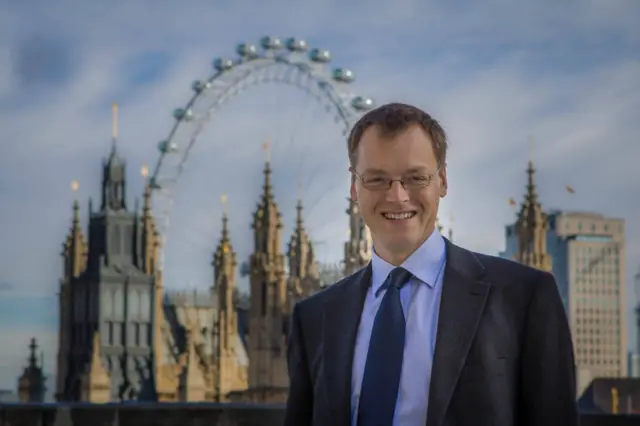 Image source, Handout
Image source, HandoutMichael Tomlinson was a barrister before entering Parliament in 2015
In a Home Office reshuffle, one immigration minister makes way for two.
Following the resignation of Robert Jenrick, enter Michael Tomlinson and Tom Pursglove, two Brexit-backing - and relatively young - Conservative MPs.
A former barrister, Tomlinson is taking on the role of minister for illegal migration. That means he’ll be responsible for steering the government’s Rwanda bill through Parliament.
It’s fair to say Tomlinson, 46, is not a household name. An MP since 2015, he was deputy chairman of the European Research Group, a Eurosceptic group of Tory MPs who had a key role in bringing down Theresa May and her Brexit deal.
He’s since worked in the governments of Boris Johnson, Liz Truss and Rishi Sunak, and had served as solicitor general from September last year.
In his new role, he’ll be working alongside Pursglove, the minister for legal migration and delivery.
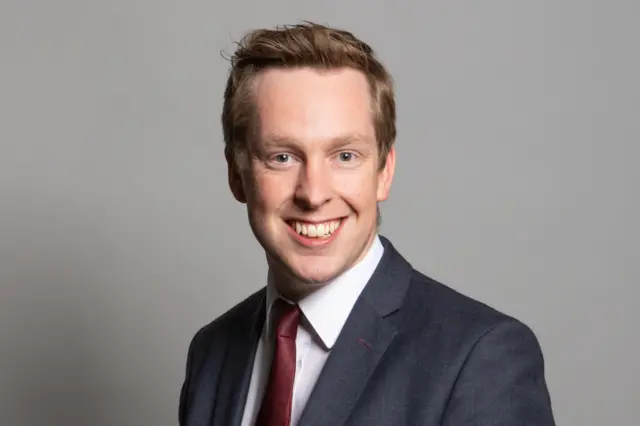 Image source, UK Parliament
Image source, UK ParliamentTom Pursglove did briefly serve as an immigration minister in Liz Truss's government
Elected at the age of 26, Pursglove was the youngest Tory MP of the 2015–17 Parliament.
A politics graduate and a former councillor, Pursglove co-founded a grassroots Brexit campaign group and was an immigration minister in Liz Truss’s short-lived government.
Upon that appointment, he said he wanted to see a “firm, but fair” immigration system. Now he has another chance to put that vision into practice.
Leader of the House of Commons Penny Mordaunt has confirmed that the emergency legislation which the government hopes will get its Rwanda asylum plan up and running will be debated by MPs next Tuesday.
Speaking in the Commons she said it was a "moral crusade to use every single tool that we have to end trafficking of human beings".
"It does not break international law nor does it blur the distinction between law-makers and those that interpret the law," she added.

Rishi Sunak repeated his statement that the number of small boat arrivals is "down by a third" this year, compared with 2022.
As of 4 December, 29,090 people had crossed the English Channel and arrived in the UK in small boats this year.
This is down by more than a third compared with the same period - 1 January to 4 December - last year, when 44,174 people crossed.
A total of 45,755 people made the crossing in 2022., external
However, the number of people crossing this year is still higher than in previous years:
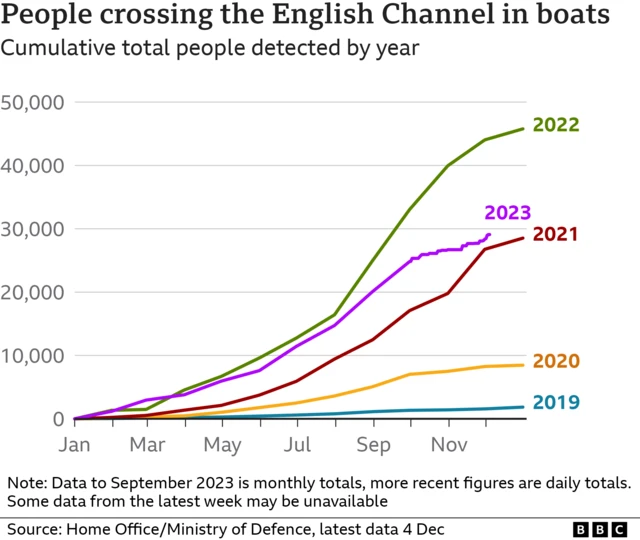 Image source, .
Image source, . Henry Zeffman
Henry Zeffman
Chief political correspondent
The fact that Rishi Sunak called a press conference at such short notice is evidence that he and his team do grasp the political peril he is now in.
But he wasn't keen to acknowledge it at the podium.
After his passionate defence of the proposed legislation, the prime minister repeatedly avoided questions by journalists which pointed to the intensifying questions about his leadership, instead urging them to ask the Labour Party about their position on the Rwanda scheme (they are opposed).
But there was one crucial admission. Sunak said that the vote on the emergency legislation would not be treated as a confidence vote. This means that MPs can defy him without having the Conservative whip withdrawn.
Sunak will no doubt spend the next few days on a massive effort to win round wavering MPs to support the legislation.
But the fact he is not wielding the ultimate threat suggests that as it stands he is not that confident in his prospects of success.
Rishi Sunak insisted his new plan to revive the stalled Rwanda asylum scheme "blocks every single reason that has ever been used to prevent flights".
As the prime minister battled to keep his Conservative MPs with him, he said that going any further in trying to over-ride international law would mean "the entire scheme will collapse".
 Ione Wells
Ione Wells
Political correspondent
Westminster is abuzz with speculation and commentary (some rather willingly offered) about how Tory MPs are responding to Rishi Sunak’s Rwanda bill.
But because there’s no urgent government business to debate or vote on today a lot of MPs are already on their trains back home.
On the one hand, this may help Rishi Sunak. It could mean less open squabbling, particularly on the airwaves, than there might otherwise have been.
On the other hand, it means Conservative MPs returning to their constituencies will potentially hear from their local parties and constituents about how they feel about this bill.
With many MPs worried about their seats right now, it’s often the reaction back home that can whip up more concern among them than the fevered speculation of this SW1 postcode.
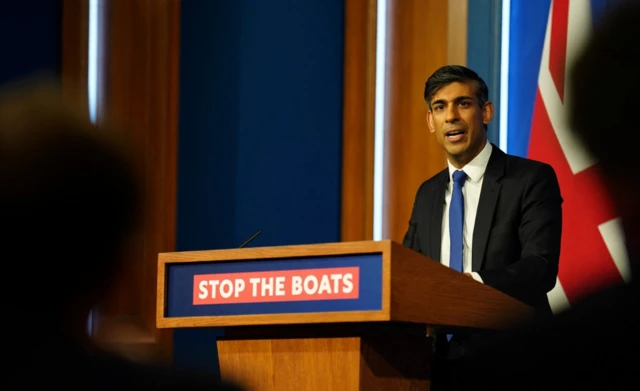 Image source, Reuters
Image source, ReutersThere we go - Rishi Sunak has held a Downing Street news conference in a bid to get on to the front foot over the Rwanda plan following last night's resignation of his immigration minister.

 Henry Zeffman
Henry Zeffman
Chief political correspondent
Towards the end of his opening statement, Rishi Sunak got to the nub of why some on the right of his party - and his former immigration minister - think the Rwanda Bill does not go far enough.
He conceded that the European Court of Human Rights in Strasbourg could still be able to hear challenges to deportations.
But he insisted that he would "not allow a foreign court to block these flights" and said that if Strasbourg did intervene he would "do what is necessary."
The - vague, at this stage - suggestion he could take further action in the future may encourage some Conservative MPs anxious that as it stands Sunak is not going far enough.
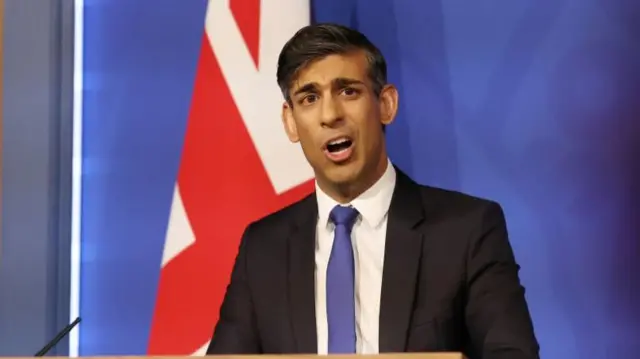 Image source, EPA
Image source, EPAGB News says migrants in Calais have told the channel they laughed at the Rwanda policy - are they right to do so?
Sunak says look at the results - the number of people crossing from France is down by a third this year, he says.
Hundreds of people smugglers have been arrested, and the UK is already disrupting criminal gangs before they get anywhere near Calais - while elsewhere in Europe, the numbers of migrants are up - he adds.
The PM says he struck a good agreement with the French and that co-operation is working - but "we've got to finish the job" and this is the only approach.